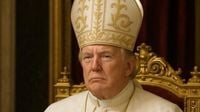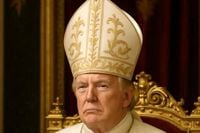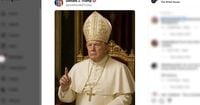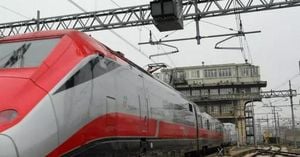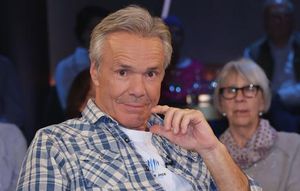On May 3, 2025, former President Donald Trump stirred controversy by posting an AI-generated image of himself dressed in papal regalia on his social media platform, Truth Social. This provocative post came just 11 days after the death of Pope Francis, a figure revered by millions worldwide. The image, which depicts Trump adorned in white robes and a large gold crucifix, quickly garnered attention, being shared on the White House's official X and Instagram accounts without any accompanying comment.
The timing of Trump’s post is particularly notable, as it coincides with the upcoming conclave set to begin on May 7, 2025, to elect the next pope. Pope Francis, who passed away on April 21, 2025, at the age of 88 due to a stroke and heart failure, had served as the leader of the Roman Catholic Church since 2013. His death has left a significant void in the Catholic community, which is currently in mourning.
Trump’s post was not without its critics. Many users reacted negatively, labeling the image as disrespectful and offensive. One comment read, "Please take this down. Many Catholics, myself included, find this as a great disrespect to the past and future leader of our church." Another user from outside the U.S. called the post "utterly disrespectful to the Catholic community worldwide," emphasizing that the papacy is a sacred institution for millions. Critics described the image as "disgusting" and accused Trump of mocking a solemn moment in the Catholic Church's history.
Despite the backlash, the post received over 100,000 likes across various platforms, including more than 58,000 on Instagram and over 78,000 on X. Supporters of Trump praised the image, claiming it "triggered the left" and shared memes in support of the former president. This polarized reaction highlights the deep divisions in public sentiment surrounding Trump and his actions.
Just days before the controversial post, Trump had joked about wanting to be pope himself when asked by reporters on the White House lawn. "I’d like to be Pope. That would be my number one choice," he stated, adding that he had no strong preference for a successor but mentioned Cardinal Timothy Dolan, the Archbishop of New York, as a notable figure. This comment was made in the context of a light-hearted discussion, but it has since been interpreted by many as insensitive, given the circumstances surrounding Pope Francis's recent passing.
Trump’s relationship with religion has often been a topic of speculation. Raised as a Presbyterian, he publicly identified with the denomination for most of his life but renounced it in October 2020, declaring himself a non-denominational Christian. His faith has been scrutinized, particularly in light of his appeals to conservative Christians and evangelicals, who have played a crucial role in his political career.
In the wake of Pope Francis's death, Trump attended the funeral service in Rome on April 26, 2025. His appearance drew criticism, as he wore a non-traditional blue suit and was seen chewing gum during the ceremony. Furthermore, his meeting with Ukrainian President Volodymyr Zelenskyy prior to the service raised eyebrows, with some questioning the appropriateness of diverting attention from the late pontiff.
As the conclave approaches, the Catholic Church is preparing to elect a new leader among 133 Cardinal electors, marking a significant moment in the church's history. The new pope will be tasked with guiding the church through contemporary challenges while maintaining its spiritual mission.
Trump's recent antics have not been limited to this incident. Earlier in the year, he shared an AI-generated video on Truth Social depicting a transformed Gaza under his proposed plans, showcasing a vision of luxury and prosperity that many found unrealistic. This pattern of sharing exaggerated or fabricated images has raised concerns about the authenticity and seriousness of his communications.
As the public awaits the outcome of the papal conclave, Trump's actions serve as a reminder of the intersection of politics and religion in contemporary America. With roughly 65% of Americans identifying as Christian, the reactions to Trump's post reflect broader societal tensions regarding faith, respect, and the role of public figures in religious discourse.
Overall, Trump's AI-generated image and his comments about the papacy have sparked a significant dialogue about the boundaries of humor and respect in the context of religion. As the Catholic community mourns the loss of Pope Francis, the focus now shifts to who will succeed him and how they will address the challenges facing the church in the modern era. The conclave will undoubtedly draw attention not only for its spiritual significance but also for the political implications surrounding the next pope's relationship with world leaders, including Trump.
